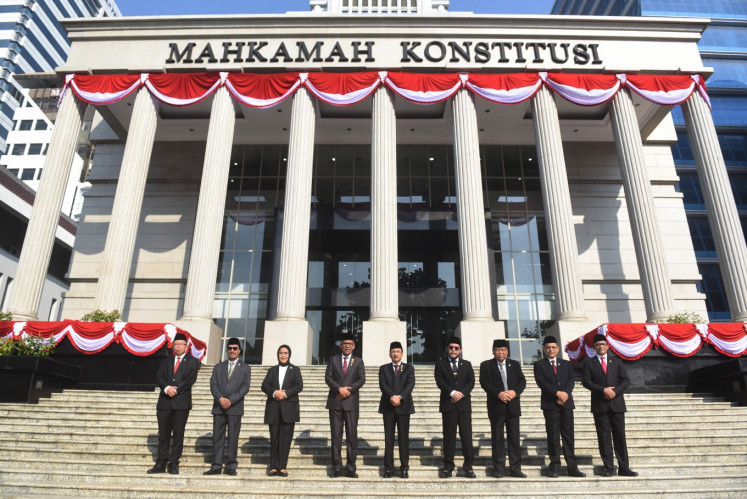Popular Reads
Top Results
Can't find what you're looking for?
View all search resultsPopular Reads
Top Results
Can't find what you're looking for?
View all search resultsXU XI: The Political is Personal
On high ground: Author Xu Xi is seen above that evanescent isle, Hong Kong
Change text size
Gift Premium Articles
to Anyone

On high ground: Author Xu Xi is seen above that evanescent isle, Hong Kong.
Indonesian writer Xu Xi translates geopolitics into fictional characters and plotline.
Chinese-Indonesian writer and editor Xu Xi, also known as Sussy Komala, who alternates between living in Hong Kong and the US, will spend the entire week doing a number of activities in Indonesia, the home of her parents (her manganese ore-trader father is from Tegal and pharmacist mother from Cilacap, both cities located in Central Java).
From July 24 to 28, she is taking part in authors-at-large writing retreat on privately owned Telunas Island in Riau while from July 30 to 31, she will be in Jakarta, facilitating a creative writing workshop and discussion called “Discover Your Creative ‘I’” organized by The Jakarta Post.
Her name may not be familiar to those who love Indonesian literary writers, but her fiction, written in English, has won praise from various reviewers.
Her debut anthology Chinese Walls (1994) garnered superlative praise from Far Eastern Economic Review magazine, while her second book Daughters of Hui (1996) made it on Asiaweek’s list of 10 best books of the year. Meanwhile, The New York Times has called her a “pioneer writer from Asia in English”. She has been honored with a O. Henry Prize story award as well as a Cohen award.
Eight books later, including the Man Asia Literary Prize finalist Habits of a Foreign Sky (2010), she recently put out her latest novel called That Man in our Lives (C&R press).
The novel seems to carry a geopolitical theme. According to the liner note on its back cover, the novel seeks to investigate “the shifting balance of power between China and the US”.

“There was a time in the United States when anything ‘Chinese’ — whether we mean the nation itself, its people or culture —was seen as very third world. At best, it was foreign or exotic; at worst, inferior or undesirable. Obviously, that’s changed vastly in the last 50 or so years,” Xu, who was born in 1954 in Hong Kong, explained to the Post in an email sent while on the writing retreat in Riau.
According to Xu, who was raised in Hong Kong and describes herself as a “first generation immigrant who became a US citizen through marriage”, the shifting balance of power is evident in the novel in terms of reverse migration by Americans to China.
“Whether it’s a young man falling in love with a Hong Kong girl and going to her home city to be with her, as opposed to her going to the US; or the American-born Chinese woman from New York whose executive job and Mandarin fluency takes her to Shanghai and her husband, a Norwegian-American writer/journalist, follows.”
Xu said the novel also investigates the meaning of being Chinese in the 21st century, which is of course complicated by whether one is from mainland China, Hong Kong or Taiwan, or if one is an American-born Chinese (typically referred to as ABC) and the cast of characters includes all these versions of “Chinese” in a story in which they interact with America and Americans.
At heart, the novel is about That Man, Gordon “Gordie” Ashberry (Hui Guo 灰果), who studied Chinese at Yale in the late 1960s, long before it was a fashionable language to study, who happened to be the boy who fell in love with all things Chinese thanks to his father, a former Flying Tigers pilot.
He is the linchpin in all these lives in the second half of the novel titled In Our Lives because he is an inspiration to those he encounters, beginning with the fathers of these younger characters, the two best friends of his lifetime. And now Gordie has disappeared during a flight delay in Tokyo, when the balance of power between the two countries has radically shifted.
Xu said she was driven to write the novel because she was fascinated by Gordie as a character, who appears to be a secondary but significant character in several of her works, including Hong Kong Rose (1999).
“Couple that with the political reality of China and US foreign policy towards it evolving over a period when Chairman Mao came to power and you almost can’t help writing about the subject,” she said of the novel that took her nine years to finish – longer than her typical works, which took on average four to five years.
She is also inspired by John Adam’s opera Nixon in China. To finish the work, she researched the history of the diplomatic relations between the two countries that led to former president Richard Nixon’s visit to the country.
Aside from music and history, literary writers, including Vladimir Nabokov, Doris Lessing, Maxine Hong Kingston, Marguerite Duras and Joseph Conrad, have also been a great inspiration to Xu.
“Nabokov taught me not to fear the imagination or the English language; Lessing and Duras showed me how women can think on the page when they shuck off patriarchal history and tradition; Kingston showed me that a Chinese writer can transform the English language and reshape the Anglo literary tradition; Conrad taught me that until you approach your own heart of darkness, you’ll never write anything worth reading.”
Speaking about patriarchy, women’s oppression, particularly “contemporary Asian women who rebel against tradition” seems to be an important theme in what Xu calls “the earlier phase” of her works. “That was basically my life, so who I was and how my experiences formed me also formed my fiction,” she said.
Women’s oppression can particularly be seen in her novella Daughters of Hui, among others, which tells the tragic story of a woman destroyed by her duties as a housewife and as a psychologically tortured girl who suffers from the consequences of her mother’s oppression by tradition and her husband.
Recently, however, Xu admitted that her creative evolution had taken her to a different phase, which ran concurrently with her latest novel and other nonfiction she’s been writing, which explores more about the meaning of global citizenry.
“Globalization has resulted, for better or worse, in global greed in the form of rampant and thoughtless consumerism for designer brands; wasteful technology that is manufactured for planned obsolescence; a ridiculous worship of excess — whether in wealth, lifestyle, violence, fame, even religion.”
She also talked about problems related to literary representation issues in a globalized world, including whether non-native speakers who write in English could still be considered part of their mother tongue’s canon, in an essay titled The English of my Story, published in Pennsylvanian journal Lake Effect: A Journey of the Literary Arts.
When asked about the challenges of finishing a book, Xu simply said that it was “life”.
“Life is always a challenge when you’re trying to complete a novel. One of the reasons this book took a long time was that I started it before I took a full-time job at a university in Hong Kong, which, once that job began, made completing it a little harder. Then there was my personal life, occupied by dealing with my widowed mother’s Alzheimer’s.”









